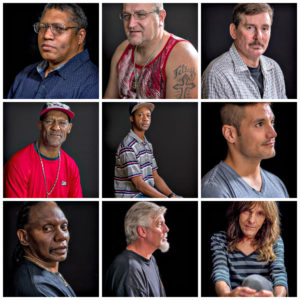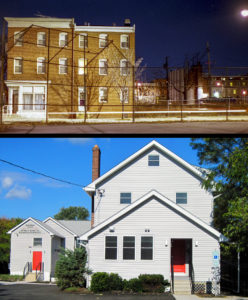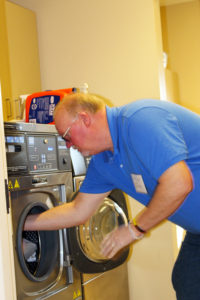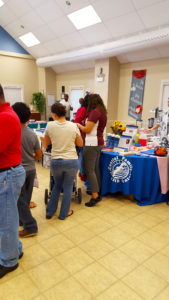For UCC Shelter Care Ministries, It’s All About Providing Hope

This collage shows some of the many men who’ve received help from United Ministries over the past 20 years. photo: Andrew Mangum
Making a difference: that’s a unifying theme among the many United Church of Christ shelter ministries operating in towns and communities across the United States. Some of the CHHSM members provide overnight facilities, some have day centers. Others provide various kinds of transitional housing. But they all fill vital needs for the people they serve.
United Ministries in Baltimore, Md., and Back Bay Mission in Biloxi, Miss., are two such agencies. United Ministries operates Earl’s Place, a recovery-focused housing program for men with substance use difficulties who are experiencing homelessness; and Prospect Place, a permanent housing program for men who have been chronically homeless and have a disability. Back Bay has a variety of services and centers for people who are homeless.
“What better example is there of filling the UCC’s Love of Neighbor mandate than through the shelter and support CHHSM ministries provide?” says Michael J. Readinger, president and CEO. “Though located in vastly different communities, both United Ministries and Back Bay Mission — and many other CHHSM organizations like them — provide the kind of compassionate care indicative of the United Church of Christ.”
While the people served in both communities have similar needs, the two organizations operate differently in order to best serve their communities.
“All of us are working with those who are in poverty and crisis, and who are often overlooked and ignored,” says Sheila Helgerson, executive director of United Ministries. “We were founded because of a need in the community and a desire to help others.”
Serving Homeless Men in Baltimore

United Ministries’ Earl’s Place (top) and Prospect Place (bottom).
Earl’s Place is in its 20th year of operation and can house 17 men at a time. Residents may stay up to two years. “Annually, we house 30-35 men, with 75 percent or more of those who leave obtaining permanent housing,” says Helgerson.
Men at Earl’s Place live in an environment “rich with peer and staff support as they work to change their behaviors,” Helgerson says. Earl’s Place currently is one of only a few supportive housing programs in the Baltimore area that allows residents to stay two years.
“There are a number of programs, including rapid rehousing programs that offer similar services, but for only 90 days to six months,” says Helgerson. “The average stay at Earl’s Place is 16 months. This gives the men time to address the causes of their homelessness, address their personal trauma, and reintegrate themselves into the community as positive and productive citizens.”
The length of stay, plus being located in a typical community with businesses, schools, renters, and homeowners, gives the men who say the time and lack of stress they need, Helgerson adds.
Prospect Place, in Baltimore County, is similar in locale and provides permanent housing to 12 men. Opened in 2015, Prospect Place still houses 9 of the original residents. The men in the program report being homeless for anywhere from 3 to 20 years, says Helgerson.
“About half of the men also have substance use issues,” she adds. “But again, we are working to meet the men where they are and working with them on the activities of daily living and reintegrating them into society.”
One of the most unique aspects of United Ministries is the extended connection to the men who have received assistance in one of the programs. Helgerson says the staff is uniquely committed to the client.
“Several former residents of Earl’s Place have been [or] are employees of United Ministries because they wanted to give back to others who are struggling,” she says.
Rebuilding While Offering Assistance

Back Bay Mission provides clients with the opportunity to shower and do laundry.
At Back Bay Mission, the local situation is impacted because of the aftermath of Hurricane Katrina in 2005, whose path created destruction along the Gulf Coast that is still felt in some communities today.
“Currently, we are not providing any traditional shelter care in our community,” says Kenney Washington, director of client services. “There was a shelter here pre-Katrina, but it has been a challenge with city officials in the Biloxi and Gulfport area to bring a shelter back to this community.”
In the meantime, Back Bay still operates a day center for homeless persons.
“The day center provides homeless or displaced clients an opportunity to take a shower and get their laundry done,” Washington says.
Back Bay is unique, says Washington, because in addition to laundry and shower services, it allows homeless or displaced persons an opportunity to receive mail and use computers for job services. The Mission also provides “case management services to support them in their efforts to become sustainable if and when they are ready to take that next step,” he adds.
Employees of Back Bay strive to make a difference “in the lives of the people who are currently homeless, or facing homelessness, seeing them as children of God and providing them with a sense of purpose in their lives when things appear bleak,” Washington says.
Needs are Many, but Rewards are Plentiful

A Back Bay Health Center gathering provides needed information.
Both Back Bay and United Ministries serve communities whose needs exceed the ability of either ministry to provide services.
“Funding is always a challenge,” Helgerson says. “The decline in public funding for transitional housing … has impacted not only us, but many of the homeless service providers in the Baltimore area.”
“The need for supportive housing and affordable permanent housing far exceeds what is available,” she adds. “An applicant may wait nearly a year for an opening in our program. We struggle with meeting the community demand while allowing a long-enough stay [at Earl’s Place] for our residents to reach their goals and maximize their chance for success.”
Washington concurs, saying, “The most pressing need is a traditional shelter, and if we ever get a shelter, funds are needed to operate it.”
Regardless of the funding challenges, both United Ministries and Back Bay Mission see the benefits of their work every time a client or resident takes that next step towards healing.
Helgerson finds joy in “watching the men who are successful move on to the next phase of their lives and then, when they come back, [it’s] not because they need our services, but because they want to say hello and/or give back by becoming a donor themselves.”
For Washington, the reward is in the work. “I think the biggest reward is providing hope to people who feel like there is no hope for their current situation, and helping people to transform their lives.”
Join Our Mailing LIst
Follow on Facebook
Emmaus Homes Advocates at State Capitol for Disability Rights Legislative Day - CHHSM
www.chhsm.org
By Christina Ingoglia, advocacy director, Emmaus Homes In mid-March, 60 Emmaus Advocates (E Advocates) — the grassroots advocacy effort at Emmaus Homes in St. Louis — showed up at the Missouri St...